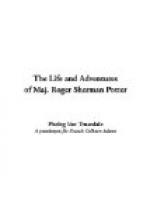“Pray, what does he say?” inquired the bystanders of one another.
“Lambabus, Jehovabus, cananius,” resumed the major, following the effort with a deep sigh.
“He speaks Latin,” replied one of the bystanders; “and as I have a little of that language at my fingers’ ends, I recognize that he says, ‘Blessed is he who dies in a noble mission.’ Yes, there! he repeats it again, and I have it exactly.”
The major continued muttering several incoherent sentences, interlarding them with words of intelligible English, which doubly confused his auditors, another of whom declared that though he never had read a verse of Latin in his life, he was sure it was not that, but some strange tongue, in which the sufferer, being a profound scholar, desired to make his “dying declaration.” They all finally came to this opinion, and agreed that a priest and a parson be called, as they were not quite sure as to his religion, and it was only necessary to have some one who knew Latin by heart. A druggist was suggested by another; but an objection was interposed on the ground that the Latin of druggists was not to be depended upon. Again, it was said the priest and the parson would get to quarreling over some nice point of doctrine, or as to the exact style of sending him to heaven, which would make it extremely unpleasant for the worldly minded lookers on. “It is just come into my head,” spoke a young man of genteel appearance and sympathizing looks, “that there lives in the neighborhood one Orlando Tickler, an Irish gentleman of much ancestry. He is reputed to be poor, but a profound critic of books; it is also said of him that he can speak numerous tongues.” Orlando Tickler was a man of fashionable aspect, and had written various learned essays, largely set with Latin sentences, on subjects connected with high art, for which he affected a love equaled only by his contempt for every American who “dabbled in it.” And, as he was always ready to give proof of his wisdom, he came at the first invitation, and with so grave and solemn a bearing that no man would have dared to dispute his wisdom.
“And now, sir,” said he, in a brogue of peculiar richness, addressing the prostrate hero, “since I see you are dying, and about to leave this world, pray what would you say in respect to yourself?”
The major (now General Roger Potter) fixed his eyes upon Mr. Tickler with such intenseness that he turned pale, and repeated his question. Whereupon the prostrate patient again muttered, “Quantibus, moribus, canibus, ma dormebus.”




